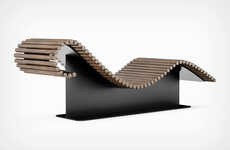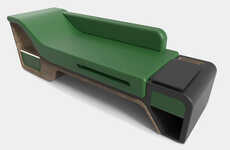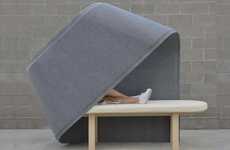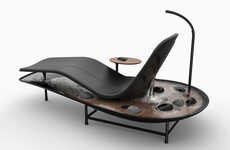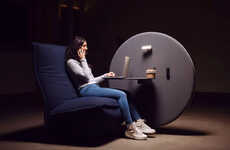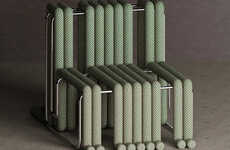
Sam Buxton's Clone Chaise Glows When the User is Present
Meghan Young — April 21, 2011 — Art & Design
If you're looking to up the sci-fi factor in your home or office, the Clone Chaise is exactly what you have been waiting for. This luminous lounger takes on the anatomical form of a human being.
Created by British designer Sam Buxton, the Clone Chaise essentially interacts with the potential user. It activates as soon as it senses that a person is near. According to Book of Joe, "The electroluminescent display lights up, and as a user interacts with the chaise lounge, its digital heart and lungs begin to beat and breathe, as if bringing the chair to life."
A stunningly unique piece of furniture, only six Clone Chaise lounges were created. They are made out of acrylic, steel and sequencing electronics.
Created by British designer Sam Buxton, the Clone Chaise essentially interacts with the potential user. It activates as soon as it senses that a person is near. According to Book of Joe, "The electroluminescent display lights up, and as a user interacts with the chaise lounge, its digital heart and lungs begin to beat and breathe, as if bringing the chair to life."
A stunningly unique piece of furniture, only six Clone Chaise lounges were created. They are made out of acrylic, steel and sequencing electronics.
Trend Themes
1. Luminous Furniture - Innovative designers can create home or office furniture that incorporate electroluminescent displays for interactive and visually stunning experiences.
2. Interactive Home Decor - Technological advancements allow for home decor items, such as the Clone Chaise, to be designed with sensors and artificial intelligence for a futuristic feel.
3. Living, Breathing Furniture - Artificial intelligence breathing furniture can be designed to make the user feel like they are interacting with a living, breathing organism as they sit and relax.
Industry Implications
1. Interior Design - The interior design industry can benefit from creating modern and interactive furniture pieces that embody the futuristic aesthetic.
2. Technology - Developments in technology can be applied to furniture design to create sensory and interactive experiences within the home or office.
3. Artificial Intelligence - The furniture industry can explore the use of artificial intelligence to create furniture that interacts and adapts to its environment and user.
2.1
Score
Popularity
Activity
Freshness

